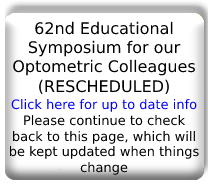Northern New Jersey Eye Institute on ZocDoc
10 Tips for Dry Eye Care
Dry eye is a common problem that many people suffer from. It occurs when your eyes don’t produce enough tears to keep themselves comfortable and healthy.
The human eye has three main layers that make up the tear film. The middle layer is the largest and also the thickest (aqueous). The lacrimal glands under the upper lids and the accessory tear glands produce this watery layer; this layer helps in keeping the eye moist, and flush out any dust, or tiny particles caught in the eye. When there is decreased production of tears coupled with excessive tear evaporation, it will cause dry eye syndrome, known as ‘dry eye’ or keratoconjunctivitis sicca (KCS).
Here’s some of our top tips to help relieve or prevent dry eye:
-
Take a break
Give your eyes a break by closing them for about 10 seconds every five to ten minutes of continuous reading or staring at a screen. Avoid being too near the TV screen as it may cause vision problems later on. For more information, see our post about computer vision syndrome.
-
Blink often
Studies show that dry eye is common to those working in front of the computer the whole day. Blink as often as you could as it helps moisten the eye and spread tears frequently. This will also reduce the risk of developing CVS (Computer Vision Syndrome).
-
Use a humidifier
Tears evaporate more slowly when the air is moist rather than when it is dry. Keep the indoor humid between 30 and 50 percent. Avoid exposing the eye directly to air as it may worsen the condition. Keep electric fan, dryer or blower away from the face.
-
Use eye drops and other lubricants
Hydroxypropyl methylcellulose is the most commonly used medication as well as Carboxymethylcellulose. However, read the instructions carefully in the label before using this over-the-counter medicine. If you suspect that you have other eye problems, consult your doctor if this product is right for you.
-
Interfering medications
Some medications such as antihistamines, antidepressants, beta-blockers, and oral contraceptives may decrease tear production, and thus worsen dry eye. You might want to consider seeking medical advice if you intend to continue using some of these products. Sometimes changing medication to an alternative one helps alleviate the dry eye symptoms while keeping the needed treatment. In any case, consult your doctor first before switching or discontinuing medication.
-
Less salt, more water
Reduce the amount of salt in your diet and drink plenty of water to stay hydrated. Too much sodium can cause dry eyes, while dehydration often makes dry eye problems worse.
-
Quit smoking
Smoking is a key contributing factor for vision problems. Smoking alters the tear film, thus exacerbating dry eye syndrome and allergic eye conditions.
-
Irritable contact lenses
If contact lenses are the cause of your dry eye, you may want to stop wearing them. Talk to your eye doctor if you need an eyeglasses prescription or if you wish to opt for laser eye surgery to correct your vision.
-
Avoid rubbing your eyes
Your hands are probably touching hundreds of different things throughout the day; dirt and foreign objects that are not so visible can be easily transferred into the eye, making the dry eye even worse.
-
More omega-3
Food supplements such as fish oil is high in omega-3 fatty acids can often help in alleviating symptoms of dry eye. see our previous blog post for more information on how diet can effect your eyes.
Dry eyes can be a chronic condition, but your eye doctor will be able to take into consideration all of your personal circumstances and advise you on the best course of action to avoid worsening your dry eye symptoms and help keep it at bay. Call or schedule an appointment online to talk to one of our eye doctors for more information.

"Dr. Crane is one of less than 100 doctors in the United States to be able to bring this new technology to his patients."
"Dr. Crane is one of less than 100 doctors in the world who have been approved to participate in the iDose FDA trial"
iDose exchange
"Dr. Crane is one of less than 15 doctors in the United States to perform this procedure for his patients."
"Dr. Crane is one of less than 15 doctors in the world who were approved to participate in the iDose exchange FDA trial"
Infinite
"Dr. Crane is one of less than 15 doctors in the United States who were able to bring this new technology to his patients."
"Dr. Crane is one of less than 15 doctors who were approved to participate in the iStent Infinite FDA trial"
General
Eye Injuries From Paintball Guns, Air Guns and Other Projectile Toys
FDA issues warning for contaminated eye drops that can cause infection.
"Dr. Crane and Glaukos have a long history of working together on several medical device and pharmaceutical studies. He has been able to offer these technologies to his patients and the products from these studies have progressed to help treat hundreds of thousands of patients in need."
Employment Opportunity: Optometrist in Essex, Morris, and Union Counties
Dr. Crane Top Doctor 2019
Congratulations to Dr. Crane for being the 2nd surgeon in the United States to perform a new treatment for Glaucoma. We hope this treatment will bring further advances in the care of our glaucoma.
ASCRS Thanks Dr. Crane for Volunteer Work
Dr. Spier Named to OSN's Premier Surgeon 300
Dr. Spier: Weekend Comedian
Dionne Warwick on Dropless Surgery [VIDEO] (Surgery Performed by Dr. Spier)
Dr. Crane and Staff congratulate their patient Dr. William Scaife
Dr. Crane named to the ASCRS Council of 100
 Dr Crane meets one of his favorite Sharks, Daymond John, at a book signing!
Dr Crane meets one of his favorite Sharks, Daymond John, at a book signing!














